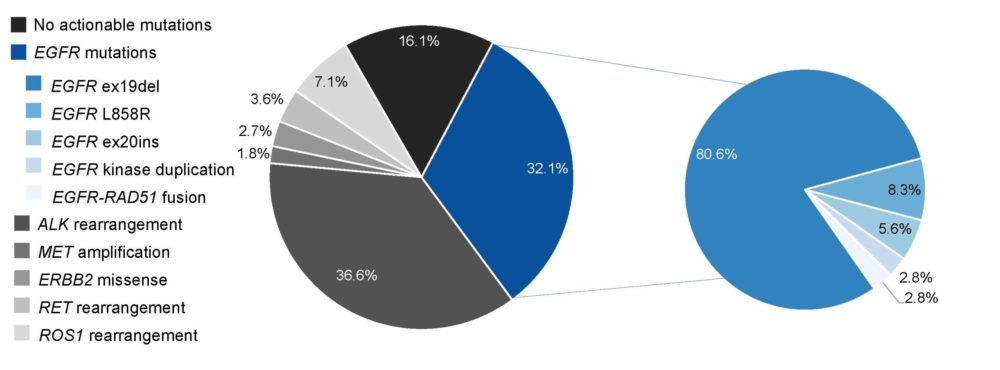
Young lung cancer illustrated by Stephen H. and family.
Data from a landmark research study shows that the biology behind “young” lung cancer – lung cancer diagnosed under the age of 40 – is different from that of the general population. The Genomics of Young Lung Cancer study, conducted by GO2 for Lung Cancer and our partner organization the Addario Lung Cancer Medical Institute (ALCMI), along with a team of investigators, was recently published in the Journal of Thoracic Oncology Clinical Reports.
The study was innovative in its design as it enrolled 133 patients across five continents, nearly half of whom enrolled remotely online. Collaborating academic investigators included individuals from University of Southern California, Dana Faber Cancer Institute, University of Turin, The Ohio State University, and Inova Schar Cancer Institute, as well as the diagnostics company Foundation Medicine.
The main results show that 84% of patients with lung adenocarcinoma enrolled in the study had a targetable, driver mutation in their cancer which could indicate a targeted therapy. This is in stark contrast to the observation of the Lung Cancer Mutation Consortium, which reported that in patients of all ages, 35% of late stage lung adenocarcinomas had a mutation. Taken together, these data show how important it is for young patients to have comprehensive biomarker testing on their cancer to ensure proper treatment.
Figure 1 from the paper shows the percentages of different, targetable driver mutations that were found in the young people’s lung cancers.
Figure 1, reproduced from Gitlitz et al. https://doi.org/10.1016/j.jtocrr.2021.100194
Bonnie J. Addario, co-founder and board chair of GO2 for Lung Cancer, reflected on the study: “We were determined to prove there was a distinct form of lung cancer in young people under 40. This group included many people with no smoking history and many who were very fit, including college athletes. The results of the Genomics of Young Lung Cancer Study show not only that there were a significant number of young people under 40 with lung cancer, but that their cancers were also rich with mutations that now have many targeted drugs.“
This finding is an important foundation for the next question of “Why?” Why are these young adults developing lung cancer? To search for clues, GO2 for Lung Cancer and ALCMI collaborated on a new study called the Epidemiology of Young Lung Cancer. This study, which is currently open and recruiting anyone diagnosed under 40 with non-small cell lung cancer in the United States, studies risk factors for young lung cancer through an extensive survey that asks about family history, locations where you lived, exposures, exercise, diet, and more; coupled with blood collection to study biological risk factors.
ALCMI shares GO2 for Lung Cancer’s commitment to transforming survivorship for everyone diagnosed with lung cancer. The results from the Genomics of Young Lung Cancer study help shed light on how to care for an important segment of our community.
The published paper on the Genomics of Young Lung Cancer study is available for download. If you were diagnosed with lung cancer before age 40, we encourage you to find out more information and enroll in the currently recruiting Epidemiology of Young Lung Cancer study.


[…] The main results show that 84% of patients with lung adenocarcinoma enrolled in the study had a targetable, driver mutation in their cancer which could indicate a targeted therapy. This is in stark contrast to the observation of the Lung Cancer Mutation Consortium, which reported that in patients of all ages, 35% of late stage lung adenocarcinomas had a mutation. Taken together, these data show how important it is for young patients to have comprehensive biomarker testing on their cancer to ensure proper treatment. Read more. […]